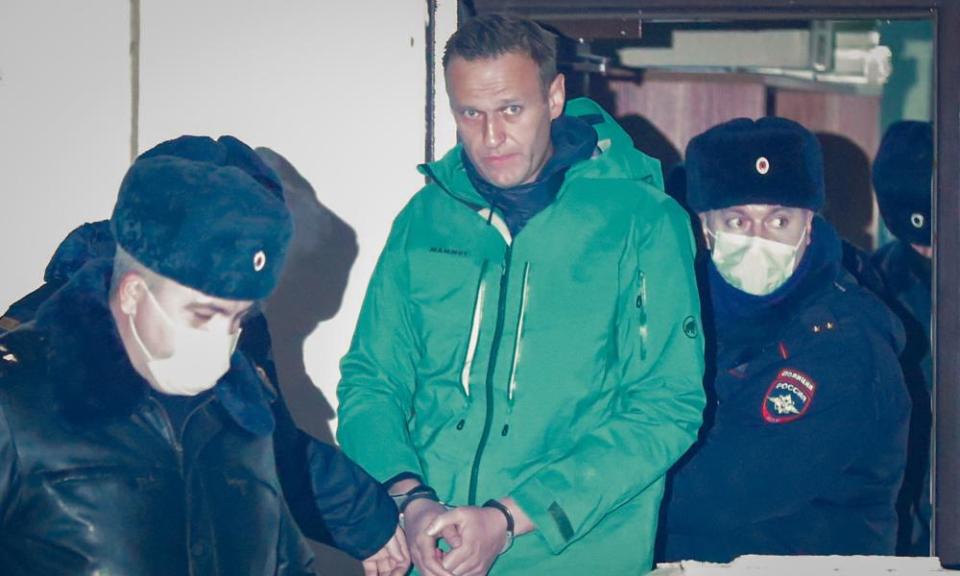The Guardian view on Alexei Navalny: such bravery needs backing

Alexei Navalny’s decision to return to Russia from Berlin, having survived a suspected assassination attempt by state security agents, was an act of extraordinary bravery. On arrival at Moscow’s Sheremetyevo airport on Sunday night, the Russian opposition leader and anti-corruption campaigner told reporters that he fully expected to be allowed to go home. But given what happened in the summer, he will have known that there was every risk that this would not happen.
In a hastily convened court hearing, held in a police station, a judge ruled on Monday that Mr Navalny would be kept in custody for 30 days. He is being held for allegedly breaching the terms of a 2014 suspended sentence, following a fraud conviction. The European court of human rights ruled that conviction to be politically motivated. It seems likely that the three-and-a-half-year sentence handed down may now be carried out.
Rather than choose the safer option of exile in Germany, Mr Navalny elected to continue the fight for democratic reform on Russian soil. At various points over the last decade or so, he has been badly beaten up while campaigning, nearly blinded in one eye following a chemical attack and regularly imprisoned. Still he came back from Berlin. In placing his arch-critic under lock and key, Vladimir Putin has shown boundless contempt for the civil rights of his citizens. Mr Navalny has shown himself willing to sacrifice his freedom for the cause he represents.
Worldwide condemnation of the Kremlin has been predictably swift. The foreign secretary, Dominic Raab, described Mr Navalny’s detention as “appalling”. Joe Biden’s incoming national security adviser, Jake Sullivan, called for the perpetrators of the assassination attempt to be brought to justice. The German foreign minister, Heiko Maas, warned Moscow about its international obligations to the rule of law and the protection of civil rights. The question is what comes next.
Confronted yet again with Mr Putin’s brutal determination to silence legitimate opposition, the west faces another bout of soul-searching. The Kremlin takes no notice whatsoever of moral lectures from foreign capitals, while targeted sanctions, such as those imposed in the wake of the Skripal affair, have had limited effect.
The timing, two days before the presidential inauguration in Washington, constitutes an early test for Mr Biden. In the autumn, as Donald Trump resisted bipartisan calls to impose sanctions following Mr Navalny’s poisoning, the president-elect pledged to work with allies to hold the Kremlin accountable for its actions. But those allies are themselves somewhat divided over how best to deal with Mr Putin.
In the wake of the suspected FSB poisoning of Mr Navalny, which is denied by the Kremlin, European Union sanctions were imposed on six senior Russian officials it believed to be associated with the plot. Despite calls for wider-ranging action, there was little appetite to go further. In Germany, Angela Merkel is likely to face renewed questions over a much-criticised $11bn gas pipeline between Russia and Germany, which is nearing completion. The German chancellor has argued that tougher economic isolation of Mr Putin’s Russia would be counterproductive. Her approach is shared by the newly elected leader of the CDU, Armin Laschet. But the impunity with which Mr Putin continues to flout international norms makes this policy of constructive engagement an increasingly hard sell.
For its part, Britain has been talking a good foreign policy game post-Brexit. Some MPs will on Tuesday vote to block a potential post-Brexit trade deal with China over human rights concerns. But there has been a reluctance to use powers such as those afforded by the Magnitsky Act to make life truly uncomfortable for Russian interests, or to clamp down on money laundering in London. Mr Navalny has put his life on the line in the battle for Russian democracy. His predicament deserves a more vigorous response than the one that followed his near-death experience in the summer.

 Yahoo Finance
Yahoo Finance 